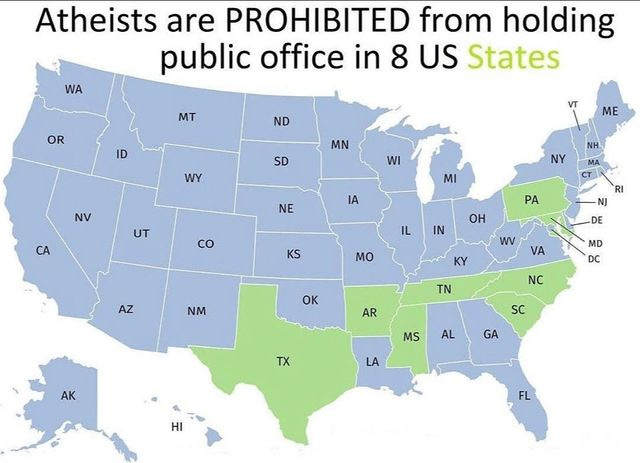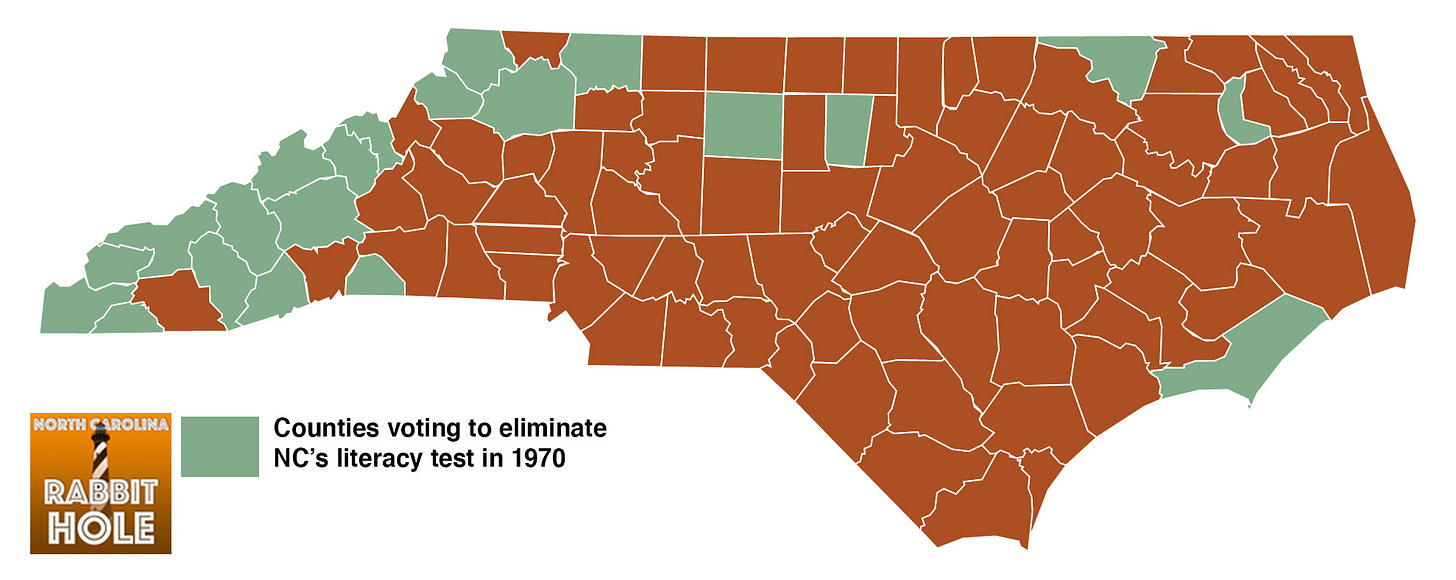What's up with the Almighty God stuff in the North Carolina constitution?
One section says you have to believe in God to run for office. Another requires a literacy test to vote. Both have been struck down, so why not remove them?
Thanks for reading the North Carolina Rabbit Hole! We’re now a reader-supported newsletter, and if you like what you’ve been reading here, please pledge your support with a monthly or yearly subscription. You’ll can read more about what you’ll get and why I’m doing this here. You can help out by clicking or tapping the button below.
I realize that if you are a young person, you have no idea who George Burns is, but just for the purposes of this anecdote, know that he played God in the 1977 film Oh, God! which also starred, for some reason, John Denver. Basically, God asks John Denver to be his new messenger on Earth. Hilarity ensues! At one point, God has to show up in court to prove the existence of… Himself. He puts himself under oath with “So help me, Me.” Then, when asked to perform a miracle, he performs a card trick.
Then, shit gets real. God makes himself disappear in front of the assembled courtroom, but not before uttering a few pithy, parting words: “If you find it hard to believe in Me, maybe it will help to know that I believe in you.”
Case dismissed!
This idea of using a court of law to prove God exists is good fodder for movies (although that scene is sort of a remix of the court scene from Miracle on 34th Street if you think about it). However! When it comes to belief in God as a requirement to hold public office in North Carolina, the courts and the North Carolina constitution are not exactly vibin’.
That there Instagram post got the attention of PolitiFact, which put out an explainer on this and found it to be… half true:

Technically, yes, it’s true that the Article VI, Section 8 of our state constitution says “any person who shall deny the being of Almighty God” cannot hold public office. But! As PolitiFact points out, a 1961 U.S. Supreme Court Case, Torasco v. Watkins, clarifies what’s clearly there in the U.S. Constitution:
You can’t have a religious test as a qualification to hold public office.
The First Amendment—the freedom of religion part—says hi.
So does the Fourteenth Amendment.
So no, you don’t have to believe in God to hold office in North Carolina, or in any other state. So, why is it still in the state constitution? Well, because when the U.S. Supreme Court declares that part of your state constitution is actually unconstitutional, they don’t actually make you go back and cross that part out with a Sharpie. Instead, lawmakers have to pass a bill to authorize a statewide vote on a constitutional amendment to repeal it. In a logical world, this seems like a no-brainer. But in the actual, political world, imagine something on the ballot that asks people to remove a sentence that includes “Almighty God.” Then imagine logging into Facebook after that.
In fact, there’s precedent for voters failing to remove a neutered section of the state constitution. Another section, Article VI, Section 4, requires a literacy test in order to vote. That part, in effect, disenfranchised poor and Black voters, and was nullified when the Voting Rights Act passed in 1965. Yet! It’s still there in the constitution, just hanging out like a racist uncle who everyone actively avoids at a family reunion. There were a lot of headlines back in March when a bipartisan group of lawmakers introduced a bill to get a constitutional amendment on the ballot to formally remove the literacy test, but it got referred to the House Rules Committee, where it’s been sitting, motionless, since June. Similar efforts in 2013 and 2019 died.
But in 1970, a constitutional amendment to remove the unconstitutional literacy test got on the ballot! It was one of seven proposed amendments that year, and it lost, 56% to 44%. Now, before you form an opinion on why that might be, know two things. One: The third amendment on the ballot that year had a lot of things rolled into it, including the elimination of the poll tax, another Jim Crow-era law that discouraged poor and Black people from voting. And two: Look at the counties in green, which were the only ones that voted to eliminate the literacy test:
As you can see, most are clustered in the mountains of Western North Carolina.
In fact, on this go-round, there was worry that people would be confused the language on the ballot, since a vote for the amendment would effectively be a vote against a literacy test. Again, the effort has been stalled for five months, but if it does pass, you’d vote on it in November 2022.
Anyway, back to the God thing. Even though it’s clear that you don’t legally need to believe in God to be elected to office, that didn’t stop someone from trying to use it against a candidate. This happened in 2009 in—wait for it—Asheville! An atheist named Cecil Bothwell was running for city council. He was threatened with a lawsuit over it by a local minister, H.K. Edgerton, a man who was somehow both a former president of Asheville’s NAACP as well as a member of the Sons of Confederate Veterans. “It’s local political opponents seeking to change the outcome of an election they lost,” Bothwell told the Associated Press back then. The challenge failed, and Bothwell was an Asheville City Council members until 2017.
What really irked some folks, however, was the fact that Bothwell used an alternative oath when he took office. Just so you know, you don’t have to put your left hand on a bible when you get sworn into office, or go under oath in court or before the legislature or whatever. Nope! There are actually three different options out there for you. One is the standard Right-Hand-Raised-Left-Hand-On-Bible oath. (Which, as of 2007, can include another holy book if requested.) A second, secular option gets rid of the words “so help me God” at the end, and replaces “swear” with “affirm.” And then there’s a third option, which I had not heard of until now. I’ll just leave the actual words of the statute here:
§ 11-3. Administration of oath with uplifted hand.
When the person to be sworn shall be conscientiously scrupulous of taking a book oath in manner aforesaid, he shall be excused from laying hands upon, or touching the Holy Gospel; and the oath required shall be administered in the following manner, namely: He shall stand with his right hand lifted up towards heaven, in token of his solemn appeal to the Supreme God, and also in token that if he should swerve from the truth he would draw down the vengeance of heaven upon his head, and shall introduce the intended oath with these words, namely:I, A.B., do appeal to God, as a witness of the truth and the avenger of falsehood, as I shall answer the same at the great day of judgment, when the secrets of all hearts shall be known (etc., as the words of the oath may be).
If you really want to GO FOR IT, then that is the oath for you. However, we as a society have not considered the Oh, God! scenario, in which a benevolent deity appears in the form of a gentle old man who needs to testify in court. In that case, “So help me Me” may suffice, although you may have a constitutional crisis on your hands if Lucifer has a good lawyer.
A note for subscribers: Mondays are usually shorter newsletters, but since this is a holiday week, I’m flipping that. You got the long version today, and I’m moving the short version to Wednesday instead of Thursday, since you’ll probably be busy on Thursday, amirite?







I won’t name names, but I can imagine a few current elected officials who would go for a the Avengers oath.